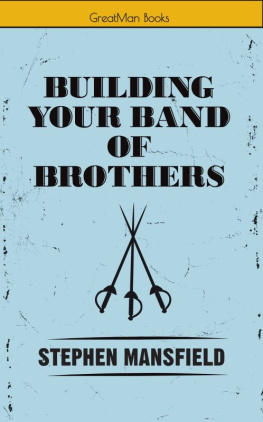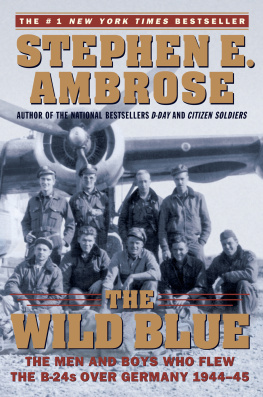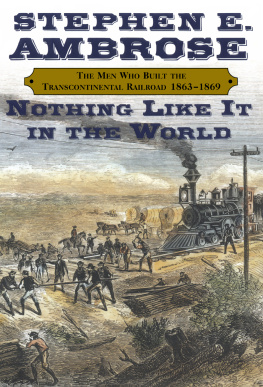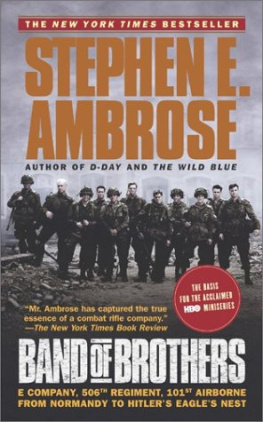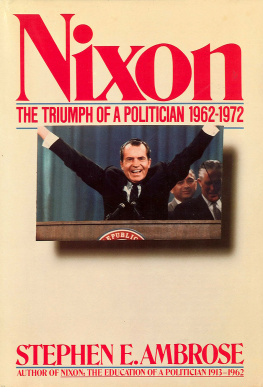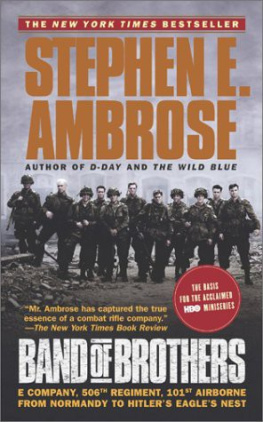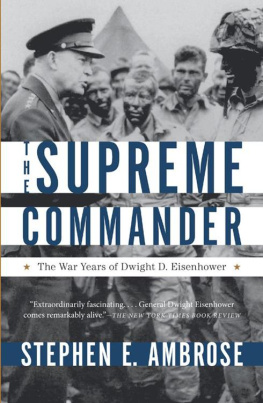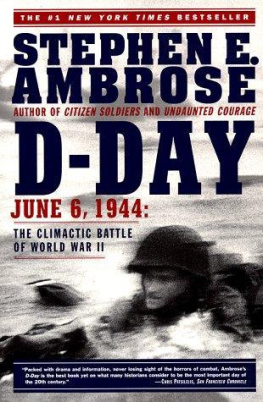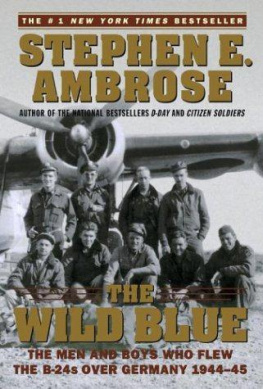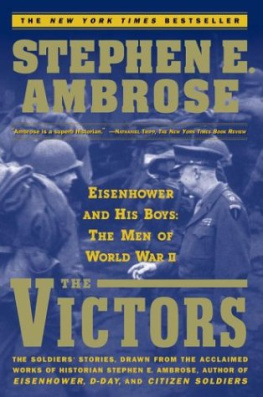Stephen Ambrose - Band of Brothers
Here you can read online Stephen Ambrose - Band of Brothers full text of the book (entire story) in english for free. Download pdf and epub, get meaning, cover and reviews about this ebook. genre: Science. Description of the work, (preface) as well as reviews are available. Best literature library LitArk.com created for fans of good reading and offers a wide selection of genres:
Romance novel
Science fiction
Adventure
Detective
Science
History
Home and family
Prose
Art
Politics
Computer
Non-fiction
Religion
Business
Children
Humor
Choose a favorite category and find really read worthwhile books. Enjoy immersion in the world of imagination, feel the emotions of the characters or learn something new for yourself, make an fascinating discovery.

- Book:Band of Brothers
- Author:
- Genre:
- Rating:3 / 5
- Favourites:Add to favourites
- Your mark:
- 60
- 1
- 2
- 3
- 4
- 5
Band of Brothers: summary, description and annotation
We offer to read an annotation, description, summary or preface (depends on what the author of the book "Band of Brothers" wrote himself). If you haven't found the necessary information about the book — write in the comments, we will try to find it.
Band of Brothers — read online for free the complete book (whole text) full work
Below is the text of the book, divided by pages. System saving the place of the last page read, allows you to conveniently read the book "Band of Brothers" online for free, without having to search again every time where you left off. Put a bookmark, and you can go to the page where you finished reading at any time.
Font size:
Interval:
Bookmark:
Stephen E. Ambrose
Band of Brothers
1 - 'WE WANTED THOSE WINGS'
*
CAMP TOCCOA
July-December 1942
The men of Easy Company, 506th Parachute Infantry Regiment, 101st Airborne Division, U.S. Army, came from different backgrounds, different parts of the country. They were farmers and coal miners, mountain men and sons of the Deep South. Some were desperately poor, others from the middle class. One came from Harvard, one from Yale, a couple from UCLA. Only one was from the Old Army, only a few came from the National Guard or Reserves. They were citizen soldiers.
They came together in the summer of 1942, by which time the Europeans had been at war for three years. By the late spring of 1944, they had become an elite company of airborne light infantry. Early on the morning of D-Day, in its first combat action, Easy captured and put out of action a German battery of four 105 mm cannon that were looking down on Utah Beach. The company led the way into Carentan, fought in Holland, held the perimeter at Bastogne, led the counteroffensive in the Battle of the Bulge, fought in the Rhineland campaign, and took Hitler's Eagle's Nest at Berchtesgaden. It had taken almost 150 percent casualties. At the peak of its effectiveness, in Holland in October 1944 and in the Ardennes in January 1945, it was as good a rifle company as there was in the world.
The job completed, the company disbanded, the men went home.
Each of the 140 men and seven officers who formed the original company followed a different route to its birthplace, Camp Toccoa, Georgia, but they had some things in common. They were young, born since the Great War. They were white, because the U.S. Army in World War II was segregated. With three exceptions, they were unmarried. Most had been hunters and athletes in high school.
They were special in their values. They put a premium on physical well being, hierarchical authority, and being part of an elite unit. They were idealists, eager to merge themselves into a group fighting for a cause, actively seeking an outfit with which they could identify, join, be a part of, relate to as a family.
They volunteered for the paratroopers, they said, for the thrill, the honor, and the $50 (for enlisted men) or $100 (for officers) monthly bonus paratroopers received. But they really volunteered to jump out of airplanes for two profound, personal reasons. First, in Robert Rader's words, "The desire to be better than the other guy took hold." Each man in his own way had gone through what Richard Winters experienced: a realization that doing his best was a better way of getting through the Army than hanging around with the sad excuses for soldiers they met in the recruiting depots or basic training. They wanted to make their Army time positive, a learning and maturing and challenging experience.
Second, they knew they were going into combat, and they did not want to go in with poorly trained, poorly conditioned, poorly motivated draftees on either side of them. As to choosing between being a paratrooper spearheading the offensive and an ordinary infantryman who could not trust the guy next to him, they decided the greater risk was with the infantry. When the shooting started, they wanted to look up to the guy beside them, not down.
They had been kicked around by the Depression, had the scars to show for it. They had grown up, many of them, without enough to eat, with holes in the soles of their shoes, with ragged sweaters and no car and often not a radio. Their educations had been cut short, either by the Depression or by the war.
"Yet, with this background, I had and still have a great love for my country," Harry Welsh declared forty-eight years later.
Whatever their legitimate complaints about how life had treated them, they had not soured on it or on their country.
They came out of the Depression with many other positive features. They were self-reliant, accustomed to hard work and to taking orders. Through sports or hunting or both, they had gained a sense of self-worth and self-confidence.
They knew they were going into great danger. They knew they would be doing more than their part. They resented having to sacrifice years of their youth to a war they never made. They wanted to throw baseballs, not grenades, shoot a .22 rifle, not an M-l. But having been caught up in the war, they decided to be as positive as possible in their Army careers.
Not that they knew much about airborne, except that it was new and all volunteer. They had been told that the physical training was tougher than anything they had ever seen, or that any other unit in the Army would undergo, but these young lions were eager for that. They expected that, when they were finished with their training, they would be bigger, stronger, tougher than when they started, and they would have gone through the training with the guys who would be fighting beside them.
"The Depression was over," Carwood Lipton recalled of that summer of 1942, "and I was beginning a new life that would change me profoundly." It would all of them.
First Lt. Herbert Sobel of Chicago was the initial member of E Company, and its C.O. His executive officer (X.O.) was 2nd Lt. Clarence Hester from northern California. Sobel was Jewish, urban, with a commission from the National Guard. Hester had started as a private, then earned his commission from Officer Candidate's School (OCS). Most of the platoon and assistant platoon leaders were newly commissioned graduates of OCS, including 2nd Lts. Dick Winters from Pennsylvania, Walter Moore from California's race tracks, and Lewis Nixon from New York City and Yale. S. L. Matheson was an ROTC graduate from UCLA. At twenty-eight years of age, Sobel was the old man in the group; the others were twenty-four or younger.
The company, along with Dog, Fox, and Battalion HQ Companies, made up the 2nd Battalion of the 506th PIR. The battalion commander was Maj. Robert Strayer, a thirty-year-old reserve officer. The regimental commander was Col. Robert Sink, a 1927 West Point graduate. The 506th was an experimental outfit, the first parachute infantry regiment in which the men would take their basic training and their jump training together, as a unit. It would be a year before it was attached to the 101st Airborne, the Screaming Eagles. The officers were as new to this paratrooping business as the men; they were teachers who sometimes were not much more than one day ahead of the class.
The original NCOs were Old Army. "We looked up to them," Pvt. Walter Gordon of Mississippi remembered, "as almost like gods because they had their wings, they were qualified jumpers. But, hell, if they knew how to do an about-face, they were ahead of us, we were raw recruits. Later, looking back, we regarded them with scorn. They couldn't measure up to our own people who moved up to corporals and sergeants."
The first privates in Easy were Frank Perconte, Herman Hansen, Wayne Sisk, and Carwood Lipton. Within a few days of its formation, Easy had a full complement of 132 men and eight officers. It was divided into three platoons and a headquarters section. There were three twelve-man rifle squads plus a six-man mortar team squad to a platoon. A light infantry outfit, Easy had one machine-gun to each of the rifle squads, and a 60 mm mortar in each mortar team.
Few of the original members of Easy made it through Toccoa. "Officers would come and go," Winters remarked. "You would take one look at them and know they wouldn't make it. Some of those guys were just a bowl of butter. They were so awkward they didn't know how to fall." This was typical of the men trying for the 506th PIR; it took 500 officer volunteers to produce the 148 who made it through Toccoa, and 5,300 enlisted volunteers to get 1,800 graduates.
As the statistics show, Toccoa was a challenge. Colonel Sink's task was to put the men through basic training, harden them, teach them the rudiments of infantry tactics, prepare them for jump school, and build a regiment that he would lead into combat. "We were sorting men," Lieutenant Hester recalled, "sorting the fat to the thin and sorting out the no guts."
Font size:
Interval:
Bookmark:
Similar books «Band of Brothers»
Look at similar books to Band of Brothers. We have selected literature similar in name and meaning in the hope of providing readers with more options to find new, interesting, not yet read works.
Discussion, reviews of the book Band of Brothers and just readers' own opinions. Leave your comments, write what you think about the work, its meaning or the main characters. Specify what exactly you liked and what you didn't like, and why you think so.

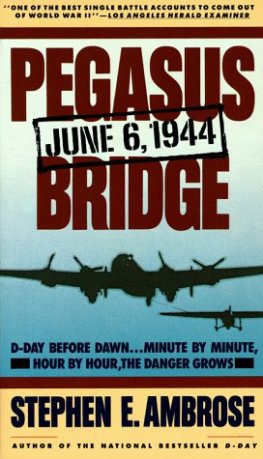
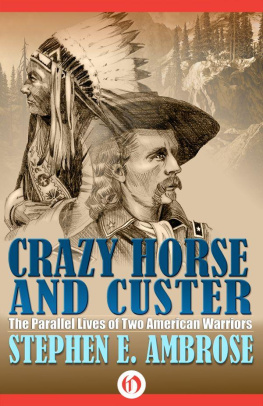
![Stephen Ambrose - Citizen Soldiers [Condensed]](/uploads/posts/book/457593/thumbs/stephen-ambrose-citizen-soldiers-condensed.jpg)
